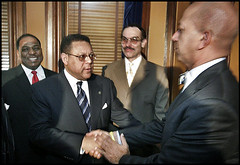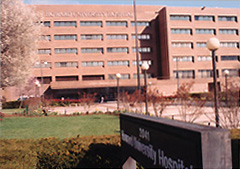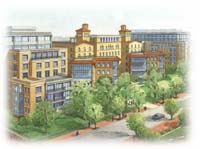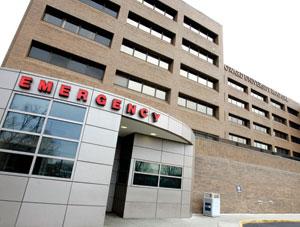Piling on the hospital issue
 Four DC- Area African-American Women Diabetics Highlighted on Educational CD-Rom. Type 2 diabetes has reached epidemic status among African-American women, with one in four African-American women older than age 55 reported as having the disease. This rate is two times higher than in white American women. In the last 12 years the percentage of African Americans with diabetes has doubled from 8.9% to 18.2%. African-American women are twice as likely as white women to be diagnosed with diabetes and once diagnosed African-American women are more likely to experience severe complications, such as kidney disease and blindness. Diabetes with its related complications is the fourth leading cause of death in the African-American community and the fifth leading cause nationwide. There is no cure for diabetes. The progression of the disease is managed through medication and changes toward a healthier lifestyle. Lifestyle modifications, such as changes in diet, weight loss, and a low-impact exercise program, can significantly reduce the complications of type 2 diabetes. However, implementing these lifestyle changes and understanding appropriate health care and medication regimens can be a challenge.
Four DC- Area African-American Women Diabetics Highlighted on Educational CD-Rom. Type 2 diabetes has reached epidemic status among African-American women, with one in four African-American women older than age 55 reported as having the disease. This rate is two times higher than in white American women. In the last 12 years the percentage of African Americans with diabetes has doubled from 8.9% to 18.2%. African-American women are twice as likely as white women to be diagnosed with diabetes and once diagnosed African-American women are more likely to experience severe complications, such as kidney disease and blindness. Diabetes with its related complications is the fourth leading cause of death in the African-American community and the fifth leading cause nationwide. There is no cure for diabetes. The progression of the disease is managed through medication and changes toward a healthier lifestyle. Lifestyle modifications, such as changes in diet, weight loss, and a low-impact exercise program, can significantly reduce the complications of type 2 diabetes. However, implementing these lifestyle changes and understanding appropriate health care and medication regimens can be a challenge.Since early summer, DC Watch has been a good source of writings about the problems posed by the National Capital Medical Center proposal by the DC Government and Howard University. I've written about this myself, in the blog and at DC Watch. Dr. Eric Rosenthal, and of course, Dorothy Brizill, have written many good posts about this, Dr. Rosenthal focusing on whether or not a new hospital is the best way to address chronic health problems and poor health outcomes in the District of Columbia.
Today's Post has a great editorial, "Certificate of Need? Yes!" that almost sounds like I wrote it... (I have noticed a couple other Post editorials that seem to follow my lead. Probably coincidence, but maybe now blogs and independent websites are becoming part of the "first draft of history" that til now has been exclusively the daily newspaper).
 Photo: Linda Davidson, The Washington Post. Mayor Tony Williams and Howard University President H. Patrick Swygert sign agreement for new National Capital Medical Center. Pictured: H. Patrick Swygert (left) signs the agreement as Mayor Williams, Councilmember Vincent Orange, and Councilmember Vincent Gray look on.
Photo: Linda Davidson, The Washington Post. Mayor Tony Williams and Howard University President H. Patrick Swygert sign agreement for new National Capital Medical Center. Pictured: H. Patrick Swygert (left) signs the agreement as Mayor Williams, Councilmember Vincent Orange, and Councilmember Vincent Gray look on.The Post has an advantage in that they can pay people to read long contracts. They found this in the deal signed by Mayor Williams:
"VI. CONDITIONS PRECEDENT TO PROCEEDING TO CONSTRUCTION PHASE 6.1. Howard's obligation to proceed with this Project is contingent upon the Council's adoption of legislation approving . . . exemption of the Project from the Certification of Need requirements."
-- "Exclusive rights agreement" between the District and Howard University....
The editorial goes on to say:
But the attempt to make an end run around the certificate-of-need review is the main subject of today's editorial. The review process is the taxpayer's principal means of ensuring -- through the work of independent experts -- that the proposed hospital is needed, does not duplicate existing services, is cost-effective and well financed, and has well-thought-out management and operational plans. The city's review process, unlike the discussions between Howard and the mayor leading up the agreement, will solicit comments from the city's other health care providers, consumers and taxpayers -- the kind of public examination that a project of this scope and potential financial impact on the city's treasury should have.
The District, by any yardstick, is going out on a financial limb to help Howard undertake this high-stakes venture. Due diligence requires implementation of the certificate-of-need review process.
Also in today's paper, in "New Hospital's Likely Prognosis: Taxpayer Bailout," Post columnist Marc Fisher makes the same point that I did in a blog entry on Friday, that someone's going to have to pick up the costs if the NCMC operates at a loss, and collectively, it can only be the residents of the District of Columbia.
 Howard University Hospital. Photo from their website.
Howard University Hospital. Photo from their website.Karen DeWitt, who is no longer the editor of the DC edition of the Examiner, but now the "senior correspondent," writing good stories almost daily, makes an important point in her article today, "National Capital Medical Center could be boon:"
If the National Capital Medical Center, a joint venture between Howard University and the District, is approved by the D.C. Council and actually gets under way, it could be a boon to the university's bottom line, laying the groundwork for Howard to divest itself of its present hospital altogether.**
Today's New York Times has two full-pages today about the crisis of diabetes in Harlem ("Living at an Epicenter of Diabetes, Defiance and Despair"). Maybe the Post could run some articles about health needs and issues at the ground level.
** How much is the site for old GWU hospital valued for anyway? The Columbia Hospital for Women?
 When you first see The Columbia Residences of Washington, D.C. you will be impressed. Its beauty, prominent location, distinctive pergolas, belfries and penthouse belvedere, rise gracefully above tree-lined 25th Street and Pennsylvania Avenue. Incorporating the historically and architecturally important Columbia Hospital for Women, The Columbia will be a perfect amalgam of the magnificently rejuvenated 1915 Italianate structure, flanked by two spectacular new buildings. (From the condominium sales website).
When you first see The Columbia Residences of Washington, D.C. you will be impressed. Its beauty, prominent location, distinctive pergolas, belfries and penthouse belvedere, rise gracefully above tree-lined 25th Street and Pennsylvania Avenue. Incorporating the historically and architecturally important Columbia Hospital for Women, The Columbia will be a perfect amalgam of the magnificently rejuvenated 1915 Italianate structure, flanked by two spectacular new buildings. (From the condominium sales website).**Note: I have no problem with Howard University redeveloping their land. Given that my first job in DC was working for an organization that had active projects in nutrition, wellness, food safety, alcohol policy, and minority health issues, I just think it would be great if the City of Washington could step forward and rethink the provision of health "care" outside of the rubric of hospitals.
If we can endeavor to create a "City of Learning," why can't Washington be a "City of Wellness" too?
The New York Times has an editorial today about Latin America, and the results of a study from the Inter-American Development Bank, where "Success depends on how policies are adopted and carried out... The researchers conclude that policies created slowly, with popular consensus, work best, especially if countries have a professional civil service, a capable and well-staffed legislature, an independent judiciary, and longstanding political parties with strong ideological platforms."
Of course, that can get in the way of the Edifice Complex (by Deyan Sudjic):
The powerful build because that is what the powerful do. On the most basic level, building creates jobs that are useful to keep a restless workforce quiet. But it also reflects well on the capability, decisiveness and the determination of the powerful. Above all, architecture is the means to tell a story about those who build it....
There is a psychological parallel between making a mark on the landscape with a building and the exercise of political power. Both depend on the imposition of will... Architecture feeds the egos of the susceptible. They grow more and more dependent on it to the point where architecture becomes an end in itself, seducing its addicts as they build on an ever-larger scale...
The appeal of architecture to those who suffer from the Edifice Complex lies in the way that it is an expression of will. To design a building, or to have a building designed is to suggest: 'This is the world as I want it. This is the perfect room to run a state, a business empire, a city, a family.'
It is the way to create a physical version of an idea, or an emotion. It is the way to construct reality as we wish it to be, rather than as it is.
 Howard University Hospital on Georgia Avenue could lose its Level 1 trauma center to the new National Capital Medical Center. Jay Westcott/Examiner
Howard University Hospital on Georgia Avenue could lose its Level 1 trauma center to the new National Capital Medical Center. Jay Westcott/ExaminerIn any event, the issue of the National Capital Medical Center will continue to be contentious, just as the closing of DC General Hospital was contentious, especially as long as the Executive branch of DC Government makes this out to be about providing better service to residents "East of the River." And then, it becomes another race issue, as indicated by some interviews relayed in the article, "Does D.C. need a new hospital?" by Michael Neibauer of the Examiner, from Sunday (I don't ever get a copy of this paper on Sundays, I've only seen it once, but the DC Primary (Health) Care Association has a good daily e-newsletter on local health care issues).
From the article:
But many residents east of the river, and others who live adjacent to the D.C. General property, ask why the city can't do both. People are dying, they say, because hospitals are too far and doctors' offices are too few. Build the hospital and lure additional primary care providers, supporters say - the east has for too long been neglected."I really hate to divide this along racial and economic boundaries, but if you look at the long-term residents who are predominantly black, they want and need a hospital," said Francis Campbell, an advisory neighborhood commissioner and hospital supporter who lives just a few blocks from the proposed NCMC site. "I'm watching new people come in here and say, 'We don't need this; we need a new system.'
Another hospital proponent, J. Greg Rhett with the D.C. Federation of Civic Associations, said the "Not In My Backyard" crowd is leading the opposition."When it comes to health care, NIMBYism is inappropriate," Rhett said. "This is a matter for the greater good."
I think this is unfair. People against the NCMC are not against the greater good, but in fact more for "the greater good" than just about anybody, because instead of focusing on building a hospital, we are more concerned about how to best create a health care system focused on improving health and wellness outcomes for all District residents.
Index Keywords: health-care-planning



0 Comments:
Post a Comment
<< Home